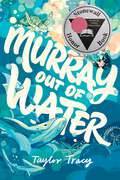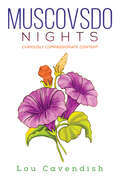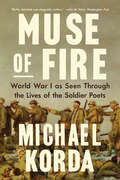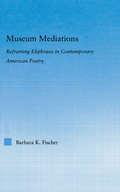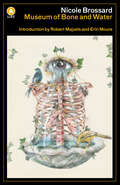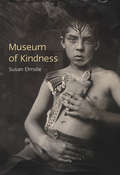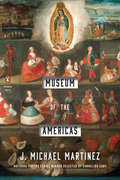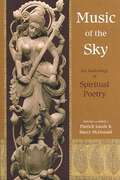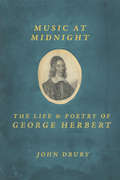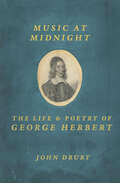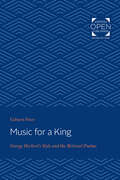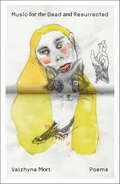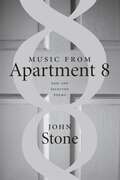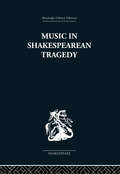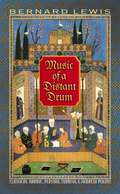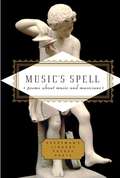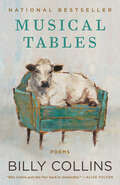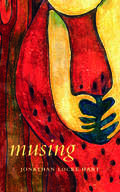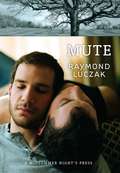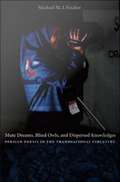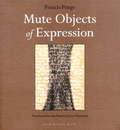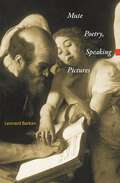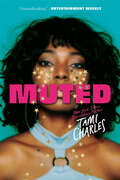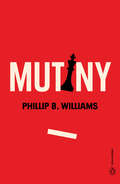- Table View
- List View
Murray Out of Water
by Taylor Tracy* A Stonewall Award Honor Book * ALA Notable Book *Perfect for fans of Rebecca Stead, Natalie Lloyd, and Jasmine Warga, this beautiful novel in verse explores one girl's struggle to regain her magic after a hurricane forces her to move away from her beloved ocean that, she believes, has given her special powers. Bighearted and observant twelve-year-old Murray O’Shea loves the ocean. Every chance she gets, she’s in it. It could be because the ocean never makes her apologize for being exactly who she is—something her family refuses to do—but it could also be because of the secret magic that Murray shares with the ocean. Though she can’t explain its presence, the electric buzz she feels from her fingertips down to her toes allows her to become one with the ocean and all its creatures, and it makes Murray feel seen in a way she never feels on land.But then a hurricane hits Murray’s Jersey Shore home, sending the O'Sheas far inland to live with relatives. Being this far from the ocean, Murray seems to lose her magic. And stuck in a house with her family, she can no longer avoid the truths she’s discovering about herself—like how she feels in the clothes her mom makes her wear, or why she doesn't have boys on the brain like other girls her age.But it’s not all hurricanes and heartache. Thankfully, Murray befriends a boy named Dylan, who has a magic of his own. When Murray agrees to partner with him for a youth roller-rama competition in exchange for help getting her magic back, the two forge an unstoppable bond—one that shows Murray how it's not always the family you were given that makes you feel whole...sometimes it's the family you build along the way.
Muscovsdo Nights: Curiously Compassionate Content
by Lou CavendishThis book is a journey through subliminal thought, A narrative of time where no fear is sought, Tales that spill love over page from pen, From this Kintsugi heart I’d not condemn, Rambling travels along winding trails, Meandering brooks sing, chanting prevail, Holding out hostage for hands that do harm, Faith centred hearts erupting with charm Blood pours from the veins of my devoted nib, While scholars lead verses of taunt and squib, Let your senses take over from all in mind, The natural direction is awfully kind.
Muse of Fire: World War I as Seen Through the Lives of the Soldier Poets
by Michael KordaThe First World War comes to harrowing life through the intertwined lives of the soldier poets in Michael Korda’s epic Muse of Fire. Michael Korda, the best-selling author of Hero and Alone, tells the story of the First World War not in any conventional way but through the intertwined lives of the soldier poets who came to describe it best, and indeed to symbolize the war’s tragic arc and lethal fury. His epic narrative begins with Rupert Brooke, “the handsomest young man in England” and perhaps its most famous young poet in the halcyon days of the Edwardian Age, and ends five years later with Wilfred Owen, killed in action at twenty-five, only one week before the armistice. With bitter irony, Owen’s mother received the telegram informing her of his death on November 11, just as church bells tolled to celebrate the war’s end. Korda’s dramatic account, which includes anecdotes from his own family history, not only brings to life the soldier poets but paints an unforgettable picture of life and death in the trenches, and the sacrifice of an entire generation. His cast of characters includes the young American poet Alan Seeger, who was killed in action as a private in the French Foreign Legion; Isaac Rosenberg, whose parents had fled czarist anti-Semitic persecution and who was killed in action at the age of twenty-eight before his fame as a poet and a painter was recognized; Robert Graves and Siegfried Sassoon, whose friendship and friendly rivalry endured through long, complicated private lives; and, finally, Owen, whose fame came only posthumously and whose poetry remains some of the most savage and heartbreaking to emerge from the cataclysmic war. As Korda demonstrates, the poets of the First World War were soldiers, heroes, martyrs, victims, their lives and loves endlessly fascinating—that of Rupert Brooke alone reads like a novel, with his journey to Polynesia in pursuit of a life like Gauguin’s and some of his finest poetry written only a year before his tragic death. Muse of Fire is at once a portrait of their lives and a narrative of a civilization destroying itself, among the rubble, shadows, and the unresolved problems of which we still live, from the revival of brutal trench warfare in Ukraine and in the Middle East.
Museum Mediations: Reframing Ekphrasis in Contemporary American Poetry (Literary Criticism and Cultural Theory)
by Barbara K. FisherFirst published in 2006. Routledge is an imprint of Taylor & Francis, an informa company.
Museum of Bone and Water (A List)
by Nicole BrossardAvailable for the first time in more than fifteen years, this collection from celebrated poet, novelist, and essayist Nicole Brossard is a provocative investigation of the human body — our physical and spiritual museums of identity and desire.Nicole Brossard’s Museum of Bone and Water delivers sensual and provocative investigations of the human body — our physical and spiritual museums of identity and desire — that pulse and surprise at every turn. In this collection, fingers, lips, fists, cheeks mingle in the palm trees of Dublin and Key West, the heat of Palermo and Madrid. With each dazzling turn and each “crazy” silence, Brossard speeds our breath and quickens our hearts, reminding us that poetry too is both a physical and spiritual reality. Museum of Bone and Water, a finalist for the Governor General’s Literary Award, is recognized as a major work in the oeuvre of leading Québécoise poet, novelist, and essayist Nicole Brossard — recently honoured with the Lifetime Recognition Award by the Griffin Trust for Excellence in Poetry. The collection is now available in a handsome A List edition with a new introduction by Robert Majzels and Erín Moure.
Museum of Kindness
by Susan ElmslieA meditative and piercing collection that explores traumas both ordinary and out of the ordinary. Museum of Kindness, Montreal poet Susan Elmslie’s searching second collection of poetry, is a book that bravely examines “genres” familiar and hard to fathom: the school shooting, PTSD, raising a child who has a disability. In poems grounded in the domestic and in workaday life, poems burnished by silence and the weight of the unspoken, poems by turns ironic and sincere, Elmslie asks “What, exactly, is / unthinkable?” Candid, urgent, celebratory, and wise, this is a book for all of us; in it, we encounter a sober and unflinching gaze that meets us where we really live and does not look away.
Museum of the Americas (National Poetry Series)
by J. Michael MartinezLonglisted for the 2018 National Book Award in Poetry Winner of the 2017 National Poetry Series Competition, selected by Cornelius Eady--an exploration in verse of imperial appropriation and Mexican American cultural identityThe poems in J. Michael Martinez's third collection of poetry circle around how the perceived body comes to be coded with the trans-historical consequences of an imperial narrative. Engaging beautiful and otherworldly Mexican casta paintings, morbid photographic postcards depicting the bodies of dead Mexicans, the strange journey of the wood and cork leg of General Santa Anna, and Martinez's own family lineage, Museum of the Americas gives accounts of migrant bodies caught beneath, and fashioned under, a racializing aesthetic gaze. Martinez questions how "knowledge" of the body is organized through visual perception of that body, hypothesizing the corporeal as a repository of the human situation, a nexus of culture. Museum of the Americas' poetic revives and repurposes the persecuted ethnic body from the appropriations that render it an art object and, therefore, diposable.
Music Of The Sky: An Anthology Of Spirit
by Patrick LaudeA collection of spiritual poetry from antiquity to the present, reflecting many styles and expressions of our experience of the sacred through the medium of poetry. Organized into three universal dimensions of spiritual life, the awareness of suffering and death, the experience of the depth of compassion and love, and the knowledge of the unity of the transcendent and immanent Real, Music of the Sky collects short poems from Buddhist, Christian, Hindu, Islamic, and Native American traditions. Meant neither as an historical survey of spiritual poetry, nor as a definitive collection of essential poems, the reader may open this book at any page, at any time, in virtually any situation, traveling or at rest. The truth and beauty of these poems are certain to provide a source of inspiration for countless generations.
Music at Midnight: The Life and Poetry of George Herbert
by John DruryThough he never published any of his English poems during his lifetime, George Herbert (1593-1633) is recognized as possibly the greatest religious poet in the language. Few English poets of his age still inspire such intense devotion today. In this richly perceptive biography, John Drury for the first time integrates Herbert’s poems fully into his life, enriching our understanding of both the poet’s mind and his work. As Drury writes in his preface, Herbert lived "a quiet life with a crisis in the middle of it. ” Drury follows Herbert from his academic success as a young man, seemingly destined for a career at court, through his abandonment of those hopes, his devotion to the restoration of a church in Huntingdonshire, and his final years as a country parson. Because Herbert’s work was only published posthumously, it has always been difficult to know when or in what context Herbert wrote his poems. But Drury skillfully places readings of the poems into his narrative at biographically credible moments, allowing us to appreciate not only Herbert’s frame of mind while writing, but also the society that produced it. A sensitive critic of Herbert’s poems as well as a theologian, Drury does full justice to the spiritual dimension of Herbert’s work. In addition, he reveals the occasions of sorrow, happiness, regret, and hope that Herbert captured in his poetry and that led T. S. Eliot to write, "What we can confidently believe is that every poem . . . is true to the poet’s experience. ” Painting a picture of a man torn between worldly ambition and spiritual life, Music at Midnight is an eloquent biography that breathes new life into some of the greatest English poems ever written.
Music at Midnight: The Life and Poetry of George Herbert
by John DruryThis &“powerfully absorbing&” biography of 17th century Welsh poet George Herbert brings essential personal and social context to his immortal poetry (Financial Times). Though he never published any of his English poems during his lifetime, George Herbert has been celebrated for centuries as one of the greatest religious poets in the language. In this richly perceptive biography, author and theologian John Drury integrates Herbert&’s poems fully into his life, enriching our understanding of both the poet&’s mind and his work. As Drury writes in his preface, Herbert lived &“a quiet life with a crisis in the middle of it.&” Beginning with his early academic success, Drury chronicles the life of a man who abandons the path to a career at court and chooses to devote himself to the restoration of a church in Huntingdonshire and lives out his life as a country parson. Because Herbert&’s work was only published posthumously, it has always been difficult to know when or in what context he wrote his poems. But Drury skillfully places readings of the poems into his narrative, allowing us to appreciate not only Herbert&’s frame of mind while writing, but also the society that produced it. He reveals the occasions of sorrow, happiness, regret, and hope that Herbert captured in his poetry and that led T. S. Eliot to write, &“What we can confidently believe is that every poem . . . is true to the poet&’s experience.&” &“It is hard to imagine a better book for anyone, general reader or seventeenth-century aficionado or teacher or student, newly embarking on Herbert.&”—The Guardian, UK
Music for a King: George Herbert's Style and the Metrical Psalms
by Coburn FreerOriginally published in 1972. Music for a King tries to study the affinities in form and matter between the versified translation of the Psalms and George Herbert's lyrics. Coburn Freer reads Herbert's poetry by way of the metrical psalms that precede it, proposing a reading that could be applied to more poems than are discussed here. Rather than multiply examples needlessly, this book stresses a few central poems as models or representatives. This reading of Herbert recognizes the historical dimension of his poems, but the author does not make that dimension the only significant one in the determination of poetic meaning or value.
Music for the Dead and Resurrected: Poems
by Valzhyna MortWINNER OF THE INTERNATIONAL GRIFFIN PRIZENAMED ONE OF THE BEST POETRY BOOKS OF 2020 BY The New York TimesIn her book of letters to the dead, the prize-winning poet Valzhyna Mort relearns how to mourn those erased by violent history. With shocking, unforgettable lyric force, Valzhyna Mort’s Music for the Dead and Resurrected confronts the legacy of violent death in one family in Belarus. In these letters to the dead, the poet asks: How do we mourn after a century of propaganda? Can private stories challenge the collective power of Soviet and American historical mythology?Mort traces a route of devastation from the Chernobyl fallout and a school system controlled by ideology to the Soviet labor camps and the massacres of World War II. While musical form serves as a safe house for the poet’s voice, old trees speak to her as the only remaining witnesses, hosts to both radiation and memory.Valzhyna Mort, born in Belarus and now living in the United States, conjures a searing, hallucinogenic ritual of rhythmic remembrance in a world where appeals to virtue and justice have irrevocably failed.
Music from Apartment 8: New and Selected Poems
by John StoneMusic from Apartment 8 is a volume of poetic works from selections of four previous books with twenty-two new works by poet/cardiologist John Stone.
Music in Shakespearean Tragedy
by F W SternfeldFirst published in 1963. When originally published this book was the first to treat at full length the contribution which music makes to Shakespeare's great tragedies, among them Hamlet, Othello, and King Lear. Here the playwright's practices are studied in conjunction with those of his contemporaries: Marlowe and Jonson, Marston and Chapman. From these comparative assessments there emerges the method that is peculiar to Shakespeare: the employment of song and instrumental music to a degree hitherto unknown, and their use as an integral part of the dramatic structure.
Music of a Distant Drum: Classical Arabic, Persian, Turkish, and Hebrew Poems
by Bernard LewisMusic of a Distant Drum marks a literary milestone. It collects 129 poems from the four leading literary traditions of the Middle East, all masterfully translated into English by Bernard Lewis, many for the first time. These poems come from diverse languages and traditions--Arabic, Persian, Turkish, and Hebrew--and span more than a thousand years. Together they provide a fascinating and unusual window into Middle Eastern history. Lewis, one of the world's greatest authorities on the region's culture and history, reveals verses of startling beauty, ranging from panegyric and satire to religious poetry and lyrics about wine, women, and love. Bernard Lewis, one of the world's greatest authorities on the region's culture and history, offers a work of startling beauty that leaves no doubt as to why such poets were courted by kings in their day. Like those in the Rubaiyat of Omar Khayyam, the poems here--as ensured by Lewis's mastery of all the source languages and his impeccable style and taste--come fully alive in English. They are surprising and sensuous, disarmingly witty and frank. They provide a fascinating and unusual glimpse into Middle Eastern history. Above all, they are a pleasure to read.They range from panegyric and satire to religious poetry and lyrics about wine, women, and love. Lewis begins with an introduction on the place of poets and poetry in Middle Eastern history and concludes with biographical notes on all the poets.This treasure trove of verse is aptly summed up by a quote from the ninth-century Arab author Ibn Qutayba: "Poetry is the mine of knowledge of the Arabs, the book of their wisdom, the muster roll of their history, the repository of their great days, the rampart protecting their heritage, the trench defending their glories, the truthful witness on the day of dispute, the final proof at the time of argument.?In one hand the Qur'vn, in the other a wineglass,Sometimes keeping the rules, sometimes breaking them.Here we are in this world, unripe and raw,Not outright heathens, not quite Muslims.--Mujir (12th century)
Music's Spell: Poems About Music And Musicians (Everyman's Library Pocket Poets Series)
by Emily FragosMusic may be the universal language that needs no words—the “language where all language ends,” as Rilke put it—but that has not stopped poets from ancient times to the present from trying to represent it in verse. <P><P> Here are Rumi and Shakespeare, Elizabeth Bishop and Billy Collins; the wild pipes of William Blake, the weeping guitars of Federico García Lorca, and the jazz rhythms of Langston Hughes; Wallace Stevens on Mozart and Thom Gunn on Elvis—the range of poets and of their approaches to the subject is as wide and varied as music itself. <P><P> The poems are divided into sections on pop and rock, jazz and blues, specific composers and works, various musical instruments, the human voice, the connection between music and love, and music at the close of life. The result is a symphony of poetic voices of all tenors and tones, the perfect gift for all musicians and music lovers.
Musical Tables: Poems
by Billy CollinsNATIONAL BESTSELLER • From the former United States Poet Laureate and New York Times bestselling author of Aimless Love, a collection of more than 125 small poems, all of them new, and each a thought or observation compressed to its emotional essence&“Whenever I pick up a new book of poems, I flip through the pages looking for small ones. Just as I might have trust in an abstract painter more if I knew he or she could draw a credible chicken, I have faith in poets who can go short.&”—Billy CollinsYou can spot a Billy Collins poem immediately. The amiable voice, the light touch, the sudden turn at the end. He "puts the &‘fun&’ back in profundity,&” says poet Alice Fulton. In his own words, his poems tend to &“begin in Kansas and end in Oz.&”Now &“America&’s favorite poet&” (The Wall Street Journal) has found a new form for his unique poetic style: the small poem. Here Collins writes about his trademark themes of nature, animals, poetry, mortality, absurdity, and love—all in a handful of lines. Neither haiku nor limerick, the small poem pushes to an extreme poetry&’s famed power to condense emotional and conceptual meaning. Inspired by the small poetry of writers as diverse as William Carlos Williams, W.S. Merwin, Kay Ryan, and Charles Simic, and written with Collins&’s recognizable wit and wisdom, the poems of Musical Tables show one of our greatest poets channeling his unique voice into a new phase of his exceptional career.3:00 AMOnly my handis asleep,but it&’s a start.
Musing
by Jonathan Locke HartMusing is a book of sonnets. Working within the framework of a classic poetic form, Jonathan Locke Hart embarks on an extended meditation on our rootedness in landscape and in the past. As sonnets, the poems are a mixture of tradition and innovation. Throughout, Hart deftly interweaves European culture with North American settings and experience. The collection opens with a foreword by noted literary scholar Gordon Teskey, who reflects on the themes that have marked the evolution of Hart's poetry. Of Musing, Teskey writes: "These deeply thoughtful poems bring layered historical consciousness into the sonnet. They also touch and stir the heart through all its levels."
Mute
by Raymond Luczak<P>Do not be afraid of your face Move into a beam of light in the bar. Smile openly Watch his hands move quicker than strobe lights as he surveys the crowd with his friends Do not think of how hard it might be to have a casual conversation. <P>From "How to Fall for a Deaf Man" <P>Silence is always a powerful statement, but even more so in the hands of Raymond Luczak, who demonstrates in his third collection what it's like to navigate between the warring languages of confusion and clarity. <P>As a deaf gay man in the hearing world, he lends an unforgettable voice to his reality of ache and loss beyond the inadequate translation of sound.
Mute Dreams, Blind Owls, and Dispersed Knowledges: Persian Poesis in the Transnational Circuitry
by Michael M. J. FischerOver the past decade Iranian films have received enormous international attention, garnering both critical praise and popular success. Combining his extensive ethnographic experience in Iran and his broad command of critical theory, Michael M. J. Fischer argues that the widespread appeal of Iranian cinema is based in a poetics that speaks not only to Iran's domestic cultural politics but also to the more general ethical dilemmas of a world simultaneously torn apart and pushed together. Approaching film as a tool for anthropological analysis, he illuminates how Iranian filmmakers have incorporated and remade the rich traditions of oral, literary, and visual media in Persian culture. Fischer reveals how the distinctive expressive idiom emerging in contemporary Iranian film reworks Persian imagery that has itself been in dialogue with other cultures since the time of Zoroaster and ancient Greece. He examines a range of narrative influences on this expressive idiom and imagery, including Zoroastrian ritual as it is practiced in Iran, North America, and India; the mythic stories, moral lessons, and historical figures written about in Iran's national epic, the Shahnameh; the dreamlike allegorical world of Persian surrealism exemplified in Sadeq Hedayat's 1939 novella The Blind Owl; and the politically charged films of the 1960s and 1970s. Fischer contends that by combining Persian traditions with cosmopolitan influences, contemporary Iranian filmmakers--many of whom studied in Europe and America--provide audiences around the world with new modes of accessing ethical and political experiences.
Mute Objects of Expression
by Francis Ponge Lee FahnestockFrancis Ponge boldly proclaims his poetic goal in Mute Objects of Expression: "To accept the challenge that objects offer to language." These objects--less chosen than received spontaneously--are perceived with inimitable Pongean humor and rendered into glimmering still lifes. He gives voice to the often unnoticed aspects of natural objects and beings. Shunning familiar poetic modes, Ponge forges new visions, images drawn from nature, from mythology and the classics. In this volume, springing from the Loire countryside in the early 1940s, Ponge's "prôems" recall the violent perfume of the mimosa, the cries of carnations, and the flirtations of wasps. From a small note- book, his sole supply of paper withinthe wartime deprivations, he composes repeated drafts of an innovative form combining poetry with analysis and impish play. Despite the demoralizing clouds of Occupation, Ponge wrests a soaring paean to his beloved sliver of Provence.
Mute Poetry, Speaking Pictures (Essays in the Arts)
by Leonard BarkanThe skirmish between painting and poetry—from Plato and Praxiteles to Rembrandt and ShakespeareWhy do painters sometimes wish they were poets—and why do poets sometimes wish they were painters? What happens when Rembrandt spells out Hebrew in the sky or Poussin spells out Latin on a tombstone? What happens when Virgil, Ovid, or Shakespeare suspend their plots to describe a fictitious painting? In Mute Poetry, Speaking Pictures, Leonard Barkan explores such questions as he examines the deliciously ambiguous history of the relationship between words and pictures, focusing on the period from antiquity to the Renaissance but offering insights that also have much to say about modern art and literature.The idea that a poem is like a picture has been a commonplace since at least ancient Greece, and writers and artists have frequently discussed poetry by discussing painting, and vice versa, but their efforts raise more questions than they answer. From Plutarch ("painting is mute poetry, poetry a speaking picture") to Horace ("as a picture, so a poem"), apparent clarity quickly leads to confusion about, for example, what qualities of pictures are being urged upon poets or how pictorial properties can be converted into poetical ones.The history of comparing and contrasting painting and poetry turns out to be partly a story of attempts to promote one medium at the expense of the other. At the same time, analogies between word and image have enabled writers and painters to think about and practice their craft. Ultimately, Barkan argues, this dialogue is an expression of desire: the painter longs for the rich signification of language while the poet yearns for the direct sensuousness of painting.
Muted
by Tami CharlesA ripped-from-the-headlines novel of ambition, music, and innocence lost, perfect for fans of Elizabeth Acevedo and Jason Reynolds!Be bold. Get seen. Be Heard.For seventeen-year-old Denver, music is everything. Writing, performing, and her ultimate goal: escaping her very small, very white hometown.So Denver is more than ready on the day she and her best friends Dali and Shak sing their way into the orbit of the biggest R&B star in the world, Sean "Mercury" Ellis. Merc gives them everything: parties, perks, wild nights -- plus hours and hours in the recording studio. Even the painful sacrifices and the lies the girls have to tell are all worth it.Until they're not.Denver begins to realize that she's trapped in Merc's world, struggling to hold on to her own voice. As the dream turns into a nightmare, she must make a choice: lose her big break, or get broken.Inspired by true events, Muted is a fearless exploration of the dark side of the music industry, the business of exploitation, how a girl's dreams can be used against her -- and what it takes to fight back.
Mutiny (Penguin Poets)
by Phillip B. WilliamsFrom the critically acclaimed author of Thief in the Interior who writes with "a lucid, unmitigated humanity" (Boston Review), a startling new collection about revolt and renewalMutiny: a rebellion, a subversion, an onslaught. In poems that rebuke classical mythos and western canonical figures, and embrace Afro-Diasporanfolk and spiritual imagery, Phillip B. Williams conjures the hell of being erased, exploited, and ill-imagined and then, through a force and generosity of vision, propels himself into life, selfhood, and a path forward. Intimate, bold, and sonically mesmerizing, Mutiny addresses loneliness, desire, doubt, memory, and the borderline between beauty and tragedy. With a ferocity that belies the tenderness and vulnerability at the heart of this remarkable collection, Williams honors the transformative power of anger, and the clarity that comes from allowing that anger to burn clean.
